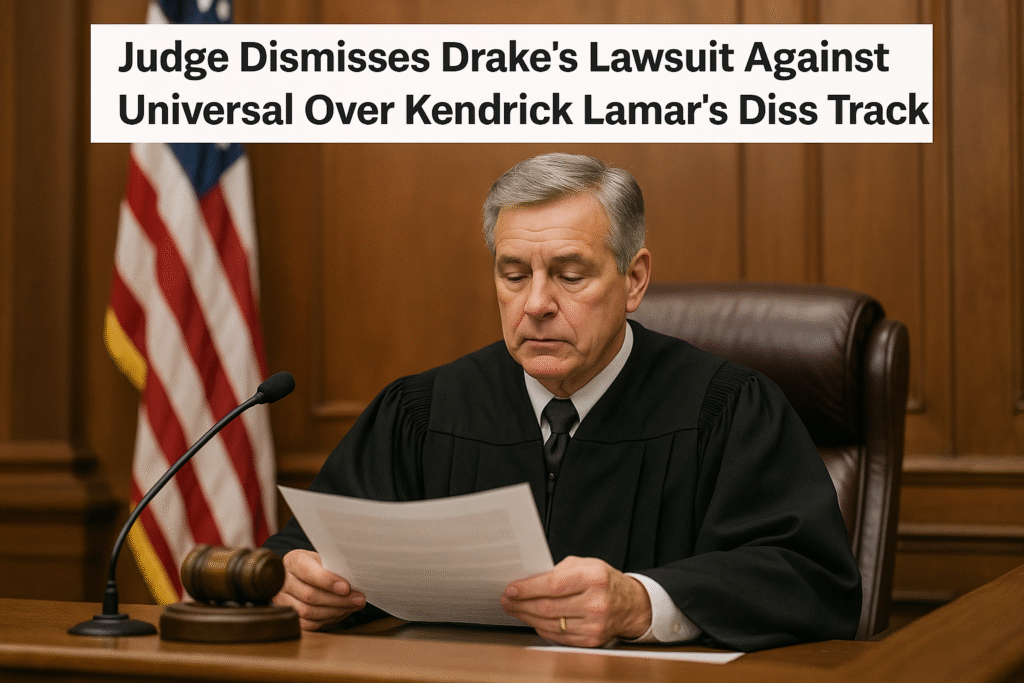By Harshit | October 10, 2025 | New York City 9:12AM EDT
A federal judge has dismissed Drake’s lawsuit against his own label, Universal Music Group (UMG), closing a chapter in the rapper’s ongoing feud with Kendrick Lamar. The case, which centered on Lamar’s chart-dominating diss track “Not Like Us,” had stirred debate about the boundaries of artistic expression, defamation, and the role of labels in rap beefs.
Drake vs. UMG
Drake filed suit in January, accusing UMG of defamation for distributing and promoting Lamar’s “Not Like Us.” The track, released in the heat of their 2024 rap battle, implied — among other explosive accusations — that Drake engaged in inappropriate behavior with underage girls.
Drake’s attorneys argued that by allowing the song to be distributed, UMG had damaged his reputation and profited from the controversy at his expense.
But Judge Jeannette Vargas rejected the claim in her Oct. 9 ruling, making clear that rap battles fall within the realm of artistic opinion rather than verifiable fact.
Judge Vargas: Diss Tracks Are Not Objective
In her written opinion, Vargas explained that “the average listener is not under the impression that a diss track is the product of a thoughtful or disinterested investigation conveying fact-checked verifiable content.”
She emphasized that rap battles are defined by exaggeration, hyperbole, and metaphor — all characteristics that make them impossible to judge by the same legal standard as journalism or documentary work.
“Not Like Us is replete with profanity, trash-talking, threats of violence, and figurative and hyperbolic language, all of which are indicia of opinion,” Vargas wrote. She added that both Drake and Lamar employed similar tones in their dueling tracks, which undercut any claim that listeners would interpret the lyrics literally.
Popularity Doesn’t Change the Standard
Drake’s legal team had argued that “Not Like Us” should be treated differently because it eclipsed other battle songs in popularity, becoming one of Lamar’s biggest hits. At one point, it even topped global charts and went viral on TikTok.
Vargas, however, dismissed this argument, noting that the song’s massive reach did not transform it into fact. “Though ‘Not Like Us’ may have dealt the metaphorical killing blow in the battle, all the songs exchanged were in dialogue with one another. The rap battle itself poured fuel onto the public fervor, not just one track,” she wrote.
UMG Celebrates Court Win
UMG, which had been accused of failing to protect its own artist, celebrated the ruling.
“From the outset, this suit was an affront to all artists and their creative expression and never should have seen the light of day,” the label said in a statement. “We’re pleased with the court’s dismissal and look forward to continuing our work successfully promoting Drake’s music and investing in his career.”
The ruling was seen as a reaffirmation of the legal protection that satire, opinion, and creative battles enjoy in U.S. courts. For UMG, it was also a chance to publicly signal its continued commitment to Drake, despite the internal rift the lawsuit highlighted.
Drake Plans to Appeal
Drake, however, signaled that the fight is far from over.
“We intend to appeal today’s ruling,” a spokesperson for the rapper told USA TODAY.
The rapper, whose feud with Lamar dominated hip-hop headlines throughout 2024, has consistently denied Lamar’s allegations. He has also sought to minimize the perception of the beef in his own music, portraying it as entertainment rather than scandal.
Still, with the lawsuit dismissed and “Not Like Us” cemented as a cultural flashpoint, the episode underscores just how far hip-hop rivalries can spill into the legal and business worlds.
A Rap Beef for the Ages
The Drake–Lamar feud has already been called one of the most significant in hip-hop history. It produced nearly a dozen diss tracks between the two megastars, sparked viral fan debates, and even influenced fashion moments — like Lamar’s subtle jab at Drake when he wore a Canadian tuxedo to the 2025 Grammys.
Now, with the lawsuit dismissed and an appeal looming, the rivalry’s impact has extended beyond music and culture into the realm of law. Whether Drake’s appeal gains traction remains to be seen, but for now, the court has made clear: in the world of diss tracks, artistic freedom takes precedence over legal claims of defamation.

